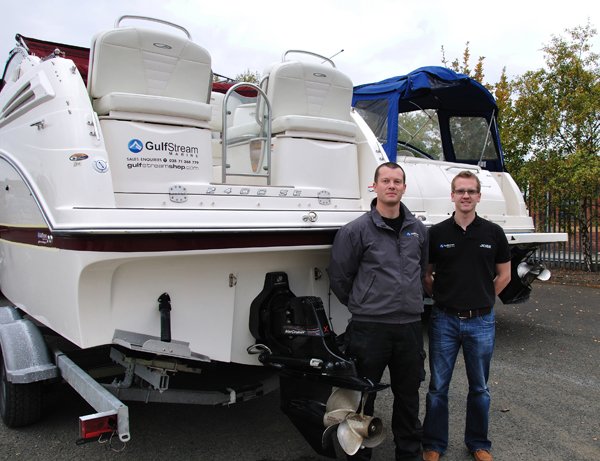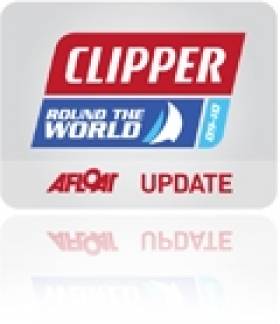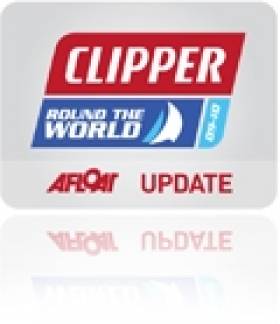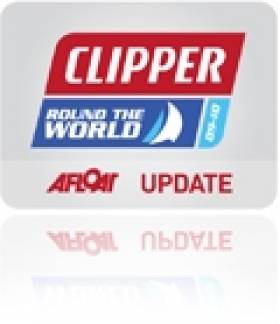Displaying items by tag: Derry
Cummins Mercruiser Expands Dealer Network
The appointment is part of CMD's strategy to improve Cummins parts, service and after sales support to the Irish market. GulfStream Marine has a strong engineering focus with a team of mobile engineers and extensive workshop facilities at its premises in Derry. Currently thecompany generates around 50% of its turnover from the provision of engineering services to both the leisure and professional sectors.
Announcing the appointment, a representative of Cummins UK CMD Marine Centre, said: 'A significant amount of new Cummins Mercruiser Diesel product has been delivered into Ireland in recent years and this is set to increase as our market share grows throughout Europe, particularly as we strengthen relationships with OEM boat builders. The recently announced Strategic Alliance between CMD and Volkswagen, also means that from 1st January 2011 the Cummins Mercruiser Diesel dealer network will assume service and warranty responsibility for all engines previously sold under the Volkswagen Marine brand'.

Cummins Technician, Mark Nicholl and GulfStream Marine Managing Director Niall Heaney.
'We are dedicated to ensuring that we have a professional back-up service available in Ireland to support this expanding product range and this is what GulfStream Marine will deliver. We are impressed with their commitment to quality of service and the expertise of their engineering department. We will be working closely together over the coming months and years to ensure that Cummins Mercruiser Diesel customers receive the highest levels of after-sales support'.
Niall Heaney, GulfStream Marine Managing Director, said: "We are delighted to be working with Cummins Mercruiser Diesel. In addition to our Mercruiser petrol inboard and Mercury outboard engine dealerships, this brand rounds out our complete marine engine sales and service offering. With our existing experienced engineering team, our reach for the provision of Cummins Mercruiser Diesel engine sales and support extends throughout the island of Ireland. In today's market customers are seeking convenient service and expert knowledge of the product; this is what we strive to deliver, with all our engineers undertaking continuous training and the ability to carry out service anywhere in the country'.
'We feel that CMD really does stand out from the competition in terms of their dedication to providing the highest levels of dealer support, which in turn means that we can deliver industry leading after-sales care to our customers. Just one example of this is their standard, free of charge, next day delivery service on all stock parts and accessories'. For further information logon to www.gulfstreamshop.com
Assistant Race Director appointed for Clipper
In recognition that the Clipper Round the World Yacht Race has grown in stature with each biennial race and that next year's 11-12 event is set to be the biggest yet, race organiser Clipper Ventures plc has appointed accomplished yachtsman and former engineer and construction manager, Justin Taylor, as the new Assistant Race Director.
Justin is no stranger to the Clipper Race, skippering Hong Kong in the 2002 edition and taking over on Hull & Humber in Clipper 09-10 after the team's skipper Piers Dudin broke his leg in the North Pacific. Justin has also spent a number of years working as a training skipper for Clipper. As Assistant Race Director Justin's responsibilities will be varied, his principal duties being the recruitment and mentoring of the race skippers, management of the race office and ensuring the safety and well being of the Clipper fleet and crews whilst at sea and in race stopovers.
Race Director, Jonathan Bailey, says, "Justin is a very accomplished yachtsman, instructor and ocean racer and has a long and successful history with Clipper Ventures making him an obvious choice for this new position. Justin will add even more experience and knowledge to the race management team in the build up and running of Clipper 11-12 and future races."
Justin is a qualified RYA Yachtmaster Ocean, RYA Yachtmaster Instructor and has more than 120,000 nautical miles under his belt. Circumnavigating the globe in Clipper 2002, Justin has also crossed the Atlantic several times and the North Pacific twice. More recently he was the winning skipper of the yacht Me To You in the inaugural 2006 Round Ireland Race.
Justin says, "I am very happy to be appointed Assistant Race Director and I am looking forward to taking up my new position. Having been a race skipper in 2002 and more recently in 2010 I feel I have much experience to bring to what will undoubtedly be a challenging but rewarding role. I am keen to be a part of the continuing success of the Clipper Round the World Yacht Race and of course adding to this success."
12 Derry Volunteers Chosen for Round the World Yacht Race
There will also be an official Derry yacht in the race, which will take in 15 ports on six continents.
New Pay to Race series to Stop in Cork, Galway and Derry
A new pay to race series around our shores with stop offs in Cork, Galway, Derry has been confirmed. The Round Britain and Ireland Challenge gets underway next year and no experience is needed pre race by the crews as a large amount of training is offered; the crews usually include a mixture of ability and experience and all the yachts are skippered by a Royal Yachting Association Yachtmaster qualified individuals.
With stop offs in a variety of ports this event should offer something for everyone interested in seeing Britain and Ireland from a new perspective whilst racing in a fleet of fantastic yachts.
The races which will start from spring 2011 are using a fleet of six bespoke brand new Dehler Varianta 44’s which are in build in Griefswald at the Hanse/Dehler yard right now. The training weekends and each race start and end in Weymouth bay, the home of the sailing events of the 2012 Olympics, with stop offs from Cork, Galway, Londonderry, Inverkip, Stornoway, Leith, Hull, London, and Cowes.
The series offers sailors of all experience levels the chance to either undertake a single leg from £600, or the whole 28 day race from £4,750 per person. Included in this price are two training weekends with around 300 sea miles, sea survival training, all port fees and food whilst at sea, Gill OS2 offshore foul weather gear, and a post race awards dinner. For more information please contact the race organisers at [email protected], or call 01305 775935 / 08456 434603.
Derry is Stopover Port for 2011-12 Clipper Round the World Race
The UK's City of Culture 2013, Derry, has today announced it is to become part of the Clipper 11-12 Round the World Yacht Race with an official city boat in the race. In addition the city will be an official host port, welcoming the ten-strong fleet in July 2012 with a showcase festival at the end of the final transatlantic stage of the 40,000-mile race en route to the race finish.
It will be the first time that Northern Ireland has been represented in the race which attracts a global audience of more than 460 million people.
The potential for the 11-12 entry was developed by Derry City Council with the support of Londonderry Port and Ocean Event Management. It will form an integral part of the campaign to market the city's culture, business and education offerings in a number of the cities on the Clipper 11-12 route. The development of the tourism and international potential for the race and festival has been supported by the Northern Ireland Tourist Board.
The yacht will be one of ten identical 68-foot ocean racing yachts, each of which is sponsored by a city, region or country to carry their name around the world. Joining the Derry entry will be Uniquely Singapore and the Chinese entry, Qingdao, for whom hosting the Clipper Race was a key step in securing the rights to host the sailing events of the Beijing 2008 Olympic Games. Both sponsors have discovered that the Clipper Race provides a unique platform for delivering global market exposure at local market values.
Derry has a long and illustrious maritime history and a key factor in the city's participation in the race will be to generate cultural and socially inclusive legacy projects for the future.
Mayor Councillor Colum Eastwood, speaking at the launch, said, "We've partnered with Clipper as we believe it provides a world class opportunity to showcase the city internationally while supporting business, education and cultural links ahead of the UK City of Culture 2013. It's an important building block in developing the city's reputation as a location for international events and brings fully into the use the full urban quayside of the River Foyle. This is the catalyst project that will bring together public, private, education, sports and community interests to build a legacy for the maritime, tourism, business and cultural interests of the city."
On board the yacht will be a team of people from all walks of life, many of whom who have never sailed before, who are taking on the challenge of a lifetime. Among them will be crew from a number of other countries but it is hoped that the men and women of Derry will also be inspired to get on board and represent their city on a global stage.
In addition to those people with a thirst for adventure who will race around the world representing the city there are opportunities for local businesses to be part of the event. Teams in previous Clipper Races have helped galvanise the community spirit in their sponsoring city, generating a huge sense of ownership and pride in their achievement.
The Clipper Race was set up by Sir Robin Knox-Johnston, the first man to sail solo, non-stop around the world, in order to give ordinary people the chance to do something truly extraordinary.
Sir Robin says, "We are delighted to welcome on board the UK's first City of Culture, Derry, as a yacht sponsor and host port for the Clipper 11-12 Race. The race offers a unique platform to showcase the city around the world, both for business and tourism. We hope that, as other cities and countries have discovered, participation in the race will enable you to build a unique legacy for the city that will last for years to come.
"We hope people from Derry~Londonderry and across Northern Ireland will sign up to take part in the race and that everyone in the city and, indeed, across the country will get behind the team and support them all the way around the world."
Berths are available for people from Derry~Londonderry to compete in the Clipper 11-12 Round the World Yacht Race and there will be public presentations in the city on 20 and 21 September at City Hotel, Derry.

































































